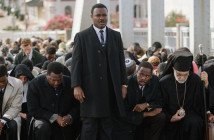Editor’s Notes: Richard Linklater’s Boyhood is now playing in limited release.
Filmmaker Richard Linklater (the Before trilogy, Bernie, Dazed and Confused) ventured to San Francisco earlier this week to discuss his latest film, Boyhood, a family-centered drama filmed over a twelve-year period. A risky proposition by any definition – made even riskier by casting a then six-year-old Ellar Coltrane as the lead character and Lorelei Linklater, Richard’s daughter, as Coltane’s older sister – Boyhood deftly explores universal themes through the highly particularistic experiences of the title character as he progresses from a sky, introspective child to a young, questing, metaphysically-inclined adult beginning college.
During the interview with Linklater, we discussed casting Boyhood’s central characters, the lengthy production process, the connection between music and memory, his longtime admiration (and love) of all things from the Criterion Collection, his most underrated film, and his least favorite interview question.
Richard Linklater: I just realized I’ve had my last three movies come out with the letter B. Bernie,Before Midnight and now Boyhood. I’m in the B phase of my career, the B movies. (laughs)
Q: Are you a fan of Michael Apted’s 7Up series. Did that inspire any part of this film?
Linklater: Everyone’s seen those but this is the difference between a documentary and fiction. We’re not taking off every seven years but I think that is a powerful reminder of capturing a moment in film.
Q: As we see Mason grow from year to year in the film, the audience has to play catch up with each scene. Did you consider putting in title cards to highlight the passage of time?
Linklater: I never wanted that. To me I was looking back. I wanted people to look at the movie and see everyone getting older but from their own observations. Nothing from outside the film should tell you anything.
Q: There’s a lot of music for the many diverse periods in the film. Did you always have songs locked in or did you experiment with other popular music of the period in the editing process?
Linklater: Always. A lot of the music we did toward the end anyway. Smells and music are the two things that can easily transport you to the past. It’s funny how our brains process memories, what triggers what.
Q: How much professional training did Ellar have prior to shooting?
Linklater: He was a mid-range professional. He had been in one movie and some commercials before he started this. As much as a six year old could, he seemed to like it. He also had the parental support; that was the key. He seemed like he’d be able to endure and he’s certainly a professional now. Twelve years of working on this. (laughs)
Q: Was there a point when we was going through puberty that he felt he didn’t want to do this anymore?
Linklater: Never. He never waivered. I never got any attitude from him, once. When he’s a little kid it’s more of a manipulation but as he gets older it’s more of a collaboration.
Q: Did you always have this project set up as a twelve year process from the beginning?
Linklater: Yes. I wanted it to go from first through twelfth grade. That was the structural device. I never questioned it.
Q: You also seemed to have some outside events guide the storytelling. With the Ethan Hawke character, he starts out as a very firm John Kerry supporter and later he seems more ambiguous.
Linklater: Not so much. I think his own life has taken over. He starts out as this youthful guy with all these opinions and a muscle car. He hasn’t been worn down by life and parenting so much but you see that slowly happen.
Q: The Criterion Collection has worked with you before putting together special editions of your films. Is there a Criterion edition of Boyhood coming in the future and if so, can you talk about some of the special features we might see on the release?
Linklater: Yeah, we’ve got a ton of behind the scenes stuff. We made [Boyhood] in the era where everyone has a digital camera, so we unearthed an interview from year one with Ellar, Lorelai, Patricia and myself, Patricia interviewed me in 2002. I hadn’t seen this since we shot it, Ellar had forgotten quite a bit of it but he got to see himself as a wide-eyed six year old. For people who like the movie, I think there will be a lot of cool little treasures.
Q: Are the video diaries only from the first year?
Linklater: No, we did interviews throughout.
Q: Have they talked to you about when they want to release it?
Linklater: I don’t know yet, but it will be cool.
Q: I think the last time you were here you were wearing a Criterion shirt.
Linklater: (laughs) Was I?
Q: Yes.
Linkalater: The New Yorker just did a profile on me and I just happened to have that Criterion shirt on. I thought I would change the shirt but they liked it so I kept it on. So then I told Peter Becker, the head of Criterion, “Hey, I got my Criterion shirt in The New Yorker. Give me that Jacques Demy box set.” He told me it’s on its way. (laughs)
Q: Have you been to the Criterion office to put together the Blu-Ray yet?
Linklater: Not yet.
Q: They have that segment on their website where they bring in directors and they take a handful of whatever Blu-Rays they want.
Linklater: I’ve been there plenty, just not lately. Before they were putting it up on their website I was the guy who was always saying, “I’ll take one of this. One of that.” (laughs)
Q: Most of my Blu-Rays are Criterions.
Linklater: Bless Criterion, without them where would we be? And it’s magical the stuff they dig up. The Persona Blu-Ray had this making of a Bergman film. It was fascinating. It’s incredible to see what it’s like to hang out on the set of Persona. (laughs)
Q: Which of your films do you feel is the most underrated?
Linklater: The Newton Boys, hands down.
Q: You’re going from city to city answering a lot of questions. Is there one question you wish would go away?
Linklater: (laughs) Not really, they’re all very natural to the process. I guess when people ask me if I see myself continuing this film into manhood, it feels like an immediate sequel. The same thing happened with the Before movies, now every interview I do is going to beg that question. Patricia said the correct answer to that question is you don’t ask a mother who’s giving birth about her next kid. That’s where we find ourselves today, still in the birthing process. (laughs)





Pingback: Boyhood Review - NP Approved - Next Projection()
Pingback: Time Without Growth: Is “Boyhood” really that great? - Next Projection()